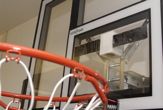Scientists Create March Madness Formula

Could this be the year that you finally experience the thrill of victory in your NCAA Men's Basketball Tournament office pool? It could be if you listen to three Georgia Tech professors.
They have devised a computerized, mathematical system that for the last nine seasons has beaten all other ranking systems, including last year when it correctly picked the Final Four teams and the eventual winner, Kansas.
Using some different basketball logic, as well as some "your calculator can't do this" kind of math, they have ranked all 65 of this year's tournament teams and even put their predictions on a bracket for you, ready to hand in. Scoring system
With almost 40 million tournament bracket prediction sheets expected to be filled out, the NCAA tournament is one of the most closely followed sports events of the year. Everyone has their own system" whether it be picking no upsets (as seeded by the tournament), listening to the pundits' picks, or even filling out multiple sheets with different scenarios. Joel Sokol, associate professor and one of the inventors of the model, warns against the go-with-your-gut approach.
"As fans, we only get to see most tournament teams two or three times at most during the season, so our gut feelings about a team are really colored by how well or poorly they played the few times we've been watching," Sokol said. Like most new logic, the ideas that Sokol and fellow professor, Paul Kvam, initially came up with to build a better game prediction system seemed obvious once they thought about it. For the two researchers, its not whether you win or lose, its about the score. While other ranking systems value a win as a win, there is a difference between beating or losing to an opponent by 1 point or by 30 points.
Joined by engineering professor George Nemhauser, they created a system that combined this actual performance with an assessment of the strength of each opponent, also known as their "strength of schedule." Factoring in the margin of victory has never been politically correct for the NCAA as they would prefer to avoid teams running up the score in a lopsided game just to improve their rankings. Yet, its inclusion in the model has been a key to its success.
Home court advantage What about those screaming home court fans and their effect on the game?
Get the world’s most fascinating discoveries delivered straight to your inbox.
The researchers found there is a significant advantage at home that would require a margin of victory of 20-22 points to overcome. In other words, if Wisconsin beat Minnesota in Madison, then to be able to confidently predict that Wisconsin would win again in Minneapolis would require about a 20 point initial victory.
Since the NCAA tournament games are played, theoretically, at neutral sites, then a game prediction system must eliminate this home court advantage to be able to pick a winner. The new system, named the LRMC (Logistic Regression/Markov Chain), adds these two leaps of logic together. Using the mathematical concept of a Markov chain, LRMC repeatedly asks the hypothetical question, "given that Team A beat Team B by X points at home (or on the road), what is the probability that A is a better team than B?” By working its way through a season of results using just scoreboard data, (who won, who lost, by how much and where), the model can begin to make ranking predictions about midway through a season. By the end of the season, a final ranking can be published.
To determine the outcome of any post-season game, the team with the higher final ranking is predicted to win. "Our system objectively measures each team's performance in every game it plays, and mathematically balances all of those outcomes to determine an overall ranking," said Sokol. Should you bet your 401K money on the LRMC bracket? No, because there are still real upsets, when a lower ranked team still knocks off a true favorite. It's the perceived upset that LRMC can detect; when a team is overvalued and seeded too high only to be sent home by a better quality team. Then, we have have some real March Madness!
- More Sports Science News
- Bracketology' Tip to Ignore Seedings After Sweet Sixteen
- Robot Madness: Creating True Artificial Intelligence
Dan Peterson writes about sports science at his site Sports Are 80 Percent Mental.
